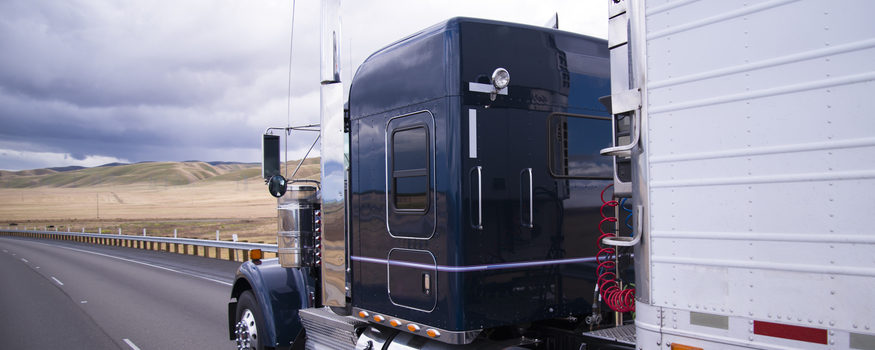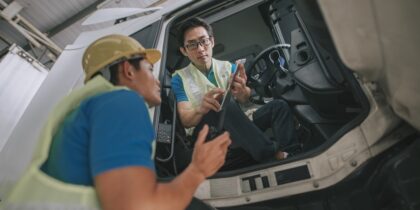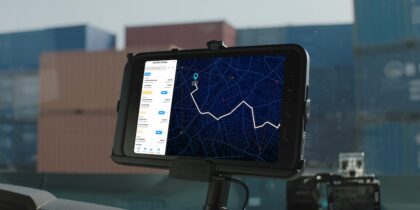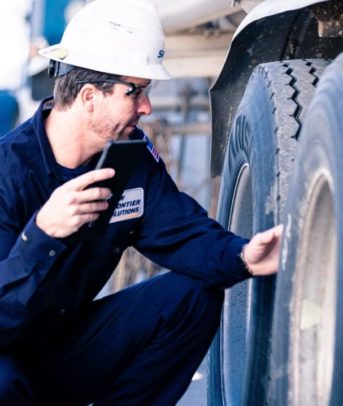The future of trucking is being shaped by fleet telematics advancements that drive new levels of efficiency for fleets of all sizes.
While the Electronic Logging Device mandate for long-haul commercial trucks goes into force December 2017, all types of fleets can benefit from going beyond basic compliance. Even if a fleet isn’t subject to the ELD requirement, managers and operators can use smartphones and tablets to track vehicle location and performance, communicate with customers and gain overall efficiencies.
The trucking industry is in a transitional phase as the falling costs of sensors, wireless communications and powerful mobile devices make it easier than ever for fleet managers to deliver better performance. Futureproofing a fleet with a telematics systems allow managers to keep pace with ongoing technology developments, and bring in a number of benefits.
Here’s a look at how different types of fleets can prepare for the future of trucking:
Carrier Fleets
The ELD mandate has prompted larger fleets to re-examine their technology strategy. A robust automated trucking fleet telematics approach can address a full range of data gathering and analytics including driver performance management, fuel economy, vehicle tracking, navigation and routing, load status and many others.
The Future of Fleet Management
Get the facts on the ELD mandate and what it means for trucking fleets. Download Now
With mobile devices, drivers can connect with load matching services such as the Omnitracs Sylectus Alliance Network to claim loads to dramatically improve utilization rates. The load matching services pair available space with available loads. Truckers that use load matching apps report they bumped up from four loaded trips a week to five, boosting earnings and receiving payments more quickly.
In the near future, truck platooning will be reality for some fleets. Drivers will use mobile devices to find nearby platooning partners to pair trucks electronically for improved fuel economy.
Small Fleets and Owner/Operators
Most small fleets don’t have an IT staff. And owner/operators just want to focus on the basics. However, smaller operators can access affordable, easy-to-implement ELD compliance and navigation through Samsung’s ELD partnerships.
The comprehensive automated trucking fleet solutions are available on a number of commercial Samsung mobile devices, with minimal installations required. These comprehensive solutions are available on many Samsung Galaxy tablet and smartphone models for a hardware and software solution that is customizable and easy to deploy right out of the box.
The system offers FMSCA-certified Hours of Service logging tools, reports and alerts to help drivers and managers stay in compliance. For managers, the web portal provides DVIR, HOS and IFTA reports. Wireless data transfer and co-driver support makes roadside inspections a breeze.
Equipped with Samsung Knox, the devices incorporate defense-grade security while data separation solutions are also available. Company data is protected, while drivers can use the personal side of the devices for personal entertainment and communication while on the road for extended periods of time.
The navigation software and routing engine will display safe driving data such as maximum heights for bridges and roads that allow hazardous loads. Overall, having an out-of-the-box offering can help smaller firms and owner/operators create an effective IT infrastructure with minimal effort.
Merchandising, Municipal, Construction and Industrial
For cement trucks, waste disposal, municipal fleets, retail fleets, construction and other private commercial truck fleets, fleet telematics deliver capabilities to optimize vehicle utilization, as well as driver performance and safety.
For these fleets, driving isn’t the main goal.
Instead, tasks like delivering merchandise, taking inventory and capturing customer data make up the bulk of the workflow. Mobile devices offer navigation and in-cab communication functions, and can also follow the driver on out-of-the-cab tasks. Drivers can use one device for all their tasks, such as managing inventories and deliveries as well as all fleet management functions.
Using the Internet of Things to make real-time date driven decisions helps these fleets optimize their assets and performance.
The future of fleet telematics is bright for all types of fleets. The transportation industry remains ripe for technological disruption that improves efficiency and customer service as well as the driver experience. Ultimately, outfitting trucks for gathering telematics can help companies, drivers and managers be more efficient — and smarter — throughout the transportation workflow.
Discover more technology advancements in the transportation field that are set to dramatically impact this rapidly changing industry.









